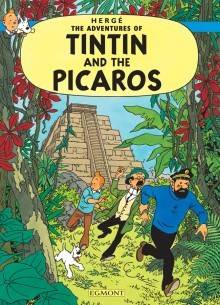

Tintin and the Picaros
by Hergé and Leslie Lonsdale-Cooper and Michael Turner
Tintin hears in the news that Bianca Castafiore, her maid, pianist and Thomson and Thompson, have been imprisoned in San Theodoros for allegedly attempting to overthrow the military dictatorship of General Tapioca, who has yet again deposed Tintin's old friend, General Alcazar. Tintin, Calculus and Haddock soon become embroiled in the accusations, and, travelling to San Theodoros to clear their names, find themselves caught in a trap laid by their old enemy, Colonel Sponsz, who has been sent by the East Bloc nation of Borduria to assist Tapioca. Sponsz has concocted the conspiracy of which Tintin and his friends are accused in a plot to wreak revenge upon them for humiliating him in The Calculus Affair. Escaping, Tintin, Haddock, and Calculus join Alcazar and his small band of guerrillas, the Picaros, in the jungle near an Arumbaya Indian village.Meanwhile, in a show trial orchestrated by Sponsz, Castafiore is sentenced to life imprisonment and the Thompsons are ordered to be executed by firing squad. Tintin enlists Alcazar's help in freeing his friends, but upon arrival at his jungle headquarters, finds that Alcazar's men have become demoralised drunkards since Tapioca started dropping copious quantities of alcohol near their camp. Additionally, Alcazar is continually henpecked by his shrewish wife Peggy, who nags him constantly about his failure to achieve a successful revolution. Fortunately, Calculus has invented a pill which will make alcohol unpalatable to anyone who ingests it (which he proves to have tested on Haddock, much to the latter's ire). Tintin offers to use the pill to cure the Picaros of their alcoholism if Alcazar agrees to make the overthrow of Tapioca bloodless. Alcazar reluctantly agrees, and as his men are cured, Jolyon Wagg arrives with his musical troupe the Jolly Follies, who intend to perform at the upcoming carnival in San Theodoros. Alcazar — with a little advice from Tintin — launches an assault on Tapioca's palace during the carnival by 'borrowing' the troupe's costumes and sneaking his men into the capital. He topples Tapioca, but on Tintin's urging, does not execute him, as is tradition; Tapioca is instead forced to publicly surrender his powers to Alcazar and is exiled, while Sponsz is sent back to Borduria.Meanwhile, Thomson and Thompson are due to be shot on the same day as the carnival (although as naive as ever in their observations, the detectives show courage by refusing to be blindfolded). Tintin and Haddock reach the state prison in time to prevent the executions from taking place. Castafiore, her maid and her pianist are also released, and Alcazar can finally give his wife the palace he has promised. With everything back in order (or not), Tintin and his friends leave. As they fly home, Tintin and Haddock express gratitude about being able to go home, showing a more weary attitude towards travel than in earlier books.The second to last panel shows a final, skeptical political message: as under Tapioca, the city slums are filled with wretched, starving people and patrolled by indifferent police. Nothing is different, except that a Viva Tapioca sign has been changed to read Viva Alcazar, demonstrating Hergé's view that even if regimes change, conditions do not improve.
Release Date:
August 26, 1993

